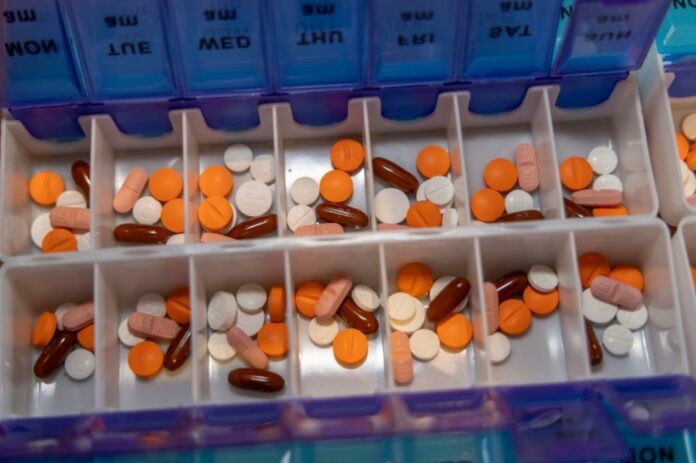Only one round of antibiotics may have a long-lasting, potentially irreversible negative impact on the good bacteria in the stomach.
The harmful side effects of antibiotics on the gut microbiome are well-known, but a recent study identified several drugs that can protect the gut microbes from damage while maintaining the antibiotics’ effectiveness against disease-causing bacteria.
The microbiome is made up of billions of bacteria, fungi, and microorganisms found naturally inside the human body and shown to have a role in immunological regulation, digestion, and vitamin production, among other functions.
A recent study by researchers at University College London (UCL) found that a single prescription of antibiotics is sufficient to alter the composition of the microbiome.
Antibiotics and Gut Microbiome
A new study, which will be unveiled at the European Congress of Clinical Microbiology & Infectious Diseases (ECCMID) in Copenhagen, Denmark from April 15th to 18th, reveals the identification of various protective drugs that could reduce the harmful effects of antibiotics while maintaining their potency against dangerous bacteria.
This research offers a glimmer of hope in the fight against antibiotic resistance, paving the way for more targeted and effective treatments.
The novel analysis of the effects of 144 antibiotics on the abundance of the most common gut bacteria by Drs. Lisa Maier and Camille V. Goemans from the European Molecular Biology Laboratory in Heidelberg, Germany, and colleagues provide novel insights into mitigating the negative effects of antibiotic treatment on the gut microbiome.
The billions of microorganisms in the human gut have far-reaching effects on health by improving digestion, supplying essential nutrients and metabolites, and cooperating with the immune system to combat pathogenic bacteria and viruses.
Antibiotics may harm these microbial populations, causing an imbalance that can result in chronic health issues including obesity, allergies, asthma, and other inflammatory or immunological illnesses, as well as recurring gastrointestinal issues brought on by Clostridioides difficile infections.
Despite the widely acknowledged harmful effects of antibiotics on various bacterial species, there has been no comprehensive and systematic investigation into which antibiotics specifically cause collateral damage and whether these negative impacts can be alleviated. The lack of research in this area can be attributed to significant technical obstacles.
In order to gain further insight into this issue, the researchers conducted a methodical analysis of the growth and viability of 27 distinct bacterial species, frequently present in the gut, after administering 144 various antibiotics. Additionally, they evaluated the minimal inhibitory concentration (MIC), which signifies the least amount of an antibiotic required to stop bacterial growth, in over 800 combinations of antibiotics and bacteria.
Their findings demonstrated that the majority of gut bacteria exhibited slightly higher MICs than the disease-causing bacteria. This indicates that the usual concentrations of antibiotics used are unlikely to harm most of the tested gut bacteria.
Protecting Gut Health with Antibiotic Antidote Drugs
Nevertheless, the study highlighted two antibiotic categories, namely tetracyclines and macrolides, that not only hindered the growth of healthy bacteria at significantly lower concentrations than required to halt the growth of harmful bacteria, but also eradicated more than 50% of the gut bacterial species under scrutiny. This potentially has long-lasting consequences for the composition of the gut microbiome.
Recognizing that drugs can have varying effects on distinct bacterial species, the researchers explored the potential of using a second drug to shield the gut microbes from damage. They conducted a study in which they combined two antibiotics (erythromycin, a macrolide, and doxycycline, a tetracycline) with a collection of 1,197 pharmaceuticals to identify suitable drugs capable of protecting two abundant gut bacterial species (Bacteriodes vulgatus and Bacteriodes uniformis) from the antibiotics’ harmful effects.
The investigation revealed several promising drugs, including the anticoagulant dicumarol, the gout medication benzbromarone, and two anti-inflammatory drugs, tolfenamic acid and diflunisal.
Crucially, the identified drugs did not compromise the potency of the antibiotics against harmful bacteria. Additional experiments indicated that these protective drugs also shielded the natural bacterial communities obtained from human stool samples and living mice.
Dr. Ulrike Löber from the Max-Delbrück-Center for Molecular Medicine in Berlin, Germany, who is presenting the research at ECCMID, remarked that this study has introduced an innovative approach that combines antibiotics with protective antidotes to preserve the health of the gut microbiome while mitigating the detrimental effects of antibiotics without compromising their effectiveness.
The expert cautioned, however, that further investigation is required to determine the optimal and individualized combinations of antidote drugs and to rule out any potential long-term impacts on the gut microbiome, despite the encouraging results.
Image Credit: Andrew Aitchison via Getty Images
